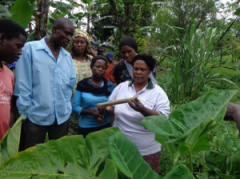This story by Evgeniya Anisimova, Steven Franzel, and Evelyne Kiptot was originally posted on the CGIAR Research Program on Policies, Institutions, and Markets (PIM) blog.
How most efficiently to help farming men and women access information and advice they need to be more effective managers of their enterprises is a puzzle not yet solved. Progress in this area will increase returns to agricultural research, as farmers are more readily able to adopt, and will enhance incomes and well-being.
Work led by the World Agroforestry Centre and the International Livestock Research Institute showed that volunteer farmer trainers (VFTs) can be effective agents of change.
The VFT approach is a form of farmer-to-farmer extension where VFTs host demonstration plots and share information on improved agricultural practices within their community. VFTs are trained by extension staff, and they, in turn, train and share information with other farmers. The results of the studies indicate that VFTs are highly effective, training on average 20 farmers per month. VFTs have an in-depth knowledge of local conditions, culture, and practices; they live in the community, speak the same language, and instill confidence in their fellow farmers, which explains this good performance.
See the full story on the PIM blog.







